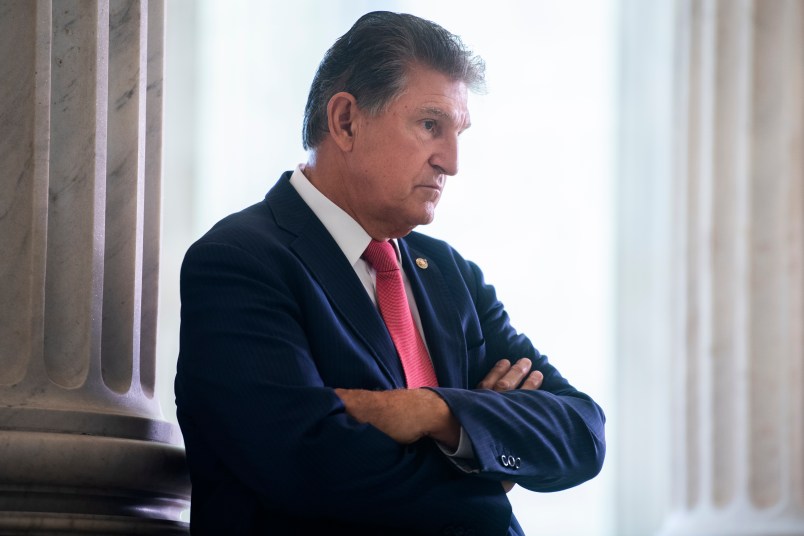Sen. Joe Manchin (D) has indicated what changes he’d like to see to both the sprawling democracy overhaul bill the Senate is slated to vote on next week and a measure to restore the Voting Rights Act that has yet to be formally introduced.
Manchin is seeking to strip several major ballot access provisions from the For the People Act, the bill currently before the Senate, which is also known as S.1. He also wants to scale back the reach of the Voting Right Act’s preclearance regime, weakening what’s in previous versions of the VRA restoration legislation, known as the John Lewis Voting Rights Advancement Act. Preclearance is the requirement that certain states with a history of racially discriminatory voting practices get federal approval for election policy changes. It was gutted by the Supreme Court in 2013, and Republicans refused to revive it when they controlled Congress.
According to a proposal document made public Wednesday, Manchin also opposes S.1’s requirement that states offer no-excuse absentee voting. He also wants changes to its voter ID language. Currently, S.1 would require that states allow non-ID holders an affidavit option to confirm their identity; Manchin’s proposal vaguely alludes to letting voters show utility bills or other forms of identification that some photo ID states do not now allow.
Manchin, according to the document, favors S.1’s mandates for early in person voting, automatic voter registration, and notifications to voters when their precinct locations change. He also wants to ban partisan gerrymandering and has proposed, in his compromise offer, making Election Day a federal holiday (a proposal that has mixed support in the voting rights community because of unintended consequences that could make voting harder for some.)
Manchin is also proposing certain changes to other aspects of the bill that deal with campaign finance and government ethics, though he is also backing major elements of those provisions.
It’s unclear whether such changes could be incorporated in S.1 before the floor vote that is planned for next week. Several of the proposals are ambiguously written and will undoubtably get pushback from other Democrats and outside advocates who have resisted narrowing S.1 so far.
Still others have acknowledged that without making some changes to the bill, it will not become law. And other Democrats are floating the idea of narrowing the legislation’s focus, perhaps just to its ballot access and gerrymandering provisions, if that’s what it takes to make S.1 law.
“If there was only one bill that this Congress can pass in this session, the one and most important one is dealing with those issues: political gerrymandering voter suppression,” Rep. Lloyd Doggett (D-TX) said a press conference Tuesday.
Even if S.1 can be watered down enough to get Manchin’s support, that alone will not be enough to get it to President Joe Biden’s desk. As long as the Senate rules remain what they are, it would also need 10 votes from the Republican caucus, which remains unified in its opposition to the bill and, more broadly, skeptical of any federal mandates for state election procedures.
Manchin has nonetheless been looking to bring Republicans on board, including with a Monday Zoom, reported by Politico Thursday, with civil rights advocates and a few GOP senators. On Monday, Manchin also made private comments to the group No Labels, reported Thursday by the Intercept, suggesting some openness to tweaking the filibuster rules — either by putting the burden on the minority to stall a bill (currently it’s the majority that must put up the votes required to advance it) or lowering the threshold.
Either way, time is running out on the self-imposed August deadline Democrats have pointed to for figuring out a path forward on S.1.
If S.1 doesn’t pass, “there better be a plan B,” Sen. Mazie Hirono (D-HI) told reporters this week. “I just don’t know what it is right at the moment.”
Kate Riga contributed reporting.
Correction: A previous version of this story incorrectly identified Manchin and Doggett as Republicans.







Either bring the votes, Joe, or step aside. You’re fucking with democracy.
Did Manchin change his party affiliation?
Nah. He’s still a DINO.
Manchin will be shocked and amazed when even this perverse mutated version of a Voting Rights Bill meets with absolute rejection from the GOP - because they are now dug-in and are now committed to opposing anything that could be scene as a Voting Rights Bill
Or is this a sign that his pointless stubbornness is weakening? Could be. His ‘suggestions’ (i.e. demands) are not very good ones, but it’s possible he could be looking for a way to save face.
Which is, unfortunately, good to see.